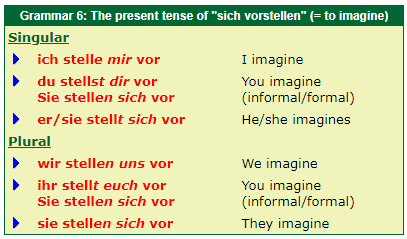Present tense of reflexive verbs taking a dative pronoun
A number of verbs use the reflexive pronoun in the dative case. only two of the dative reflexive pronouns are different from their equivalent accusative reflexive pronoun. These are mich and dich which become mir and dir respectively.

Great care must be taken with using this particular verb. As we have seen, when sich vorstellen takes a reflexive pronoun in the accusative case, it means "to introduce oneself". And when it takes a non-reflexive object in the accusative case it means "to introduce somebody else":
Ich stelle ihn vor (I introduce him (= accusative))
Ich stelle mich vor (I introduce myself (= accusative))
Ich stelle mir vor (I imagine (= dative))
 英语
英语 日语
日语 韩语
韩语 法语
法语 西班牙语
西班牙语 意大利语
意大利语 阿拉伯语
阿拉伯语 葡萄牙语
葡萄牙语 越南语
越南语 俄语
俄语 芬兰语
芬兰语 泰语
泰语 丹麦语
丹麦语 对外汉语
对外汉语

